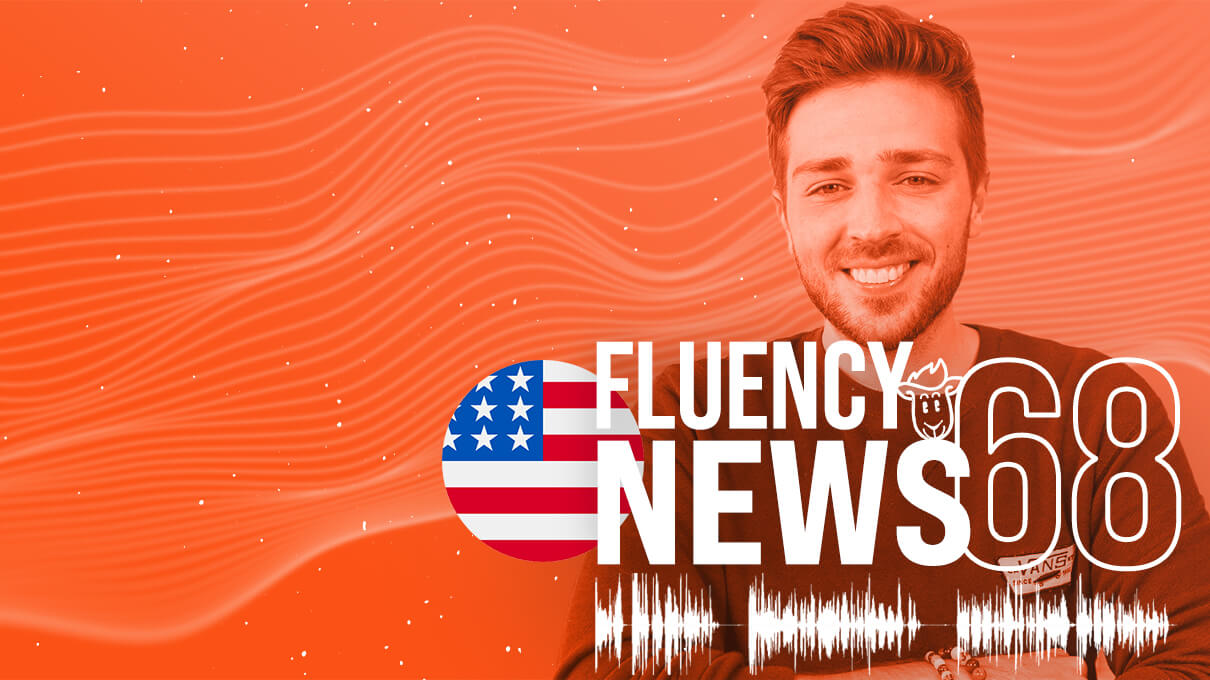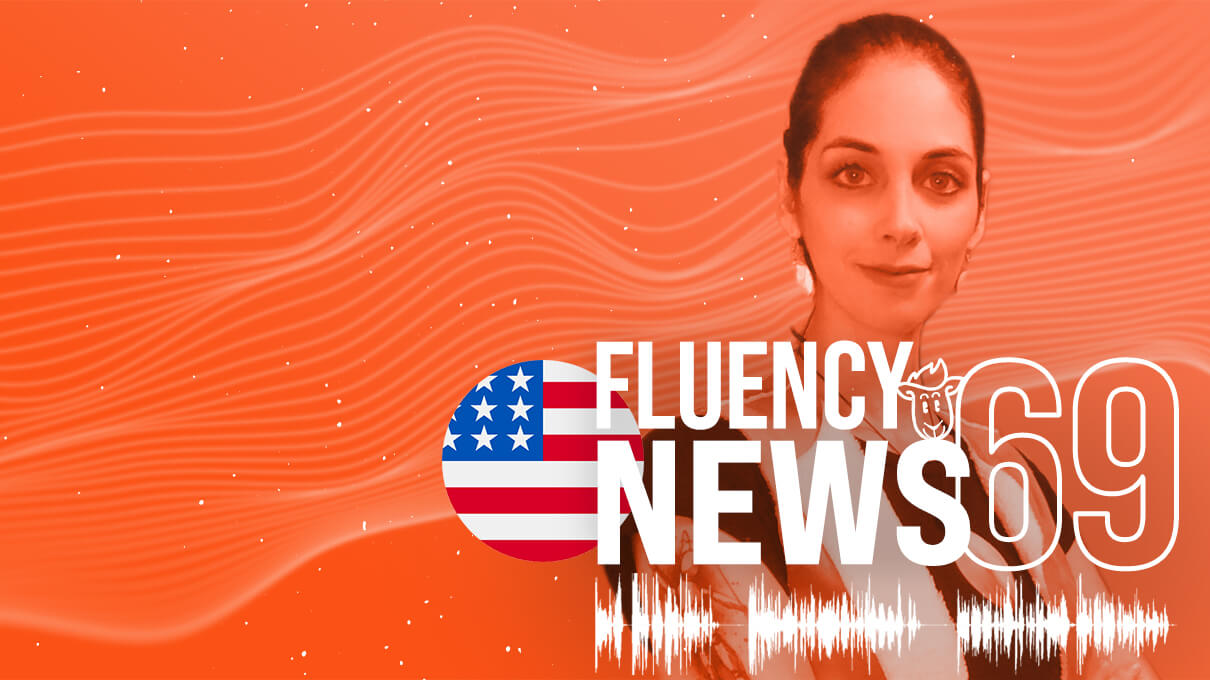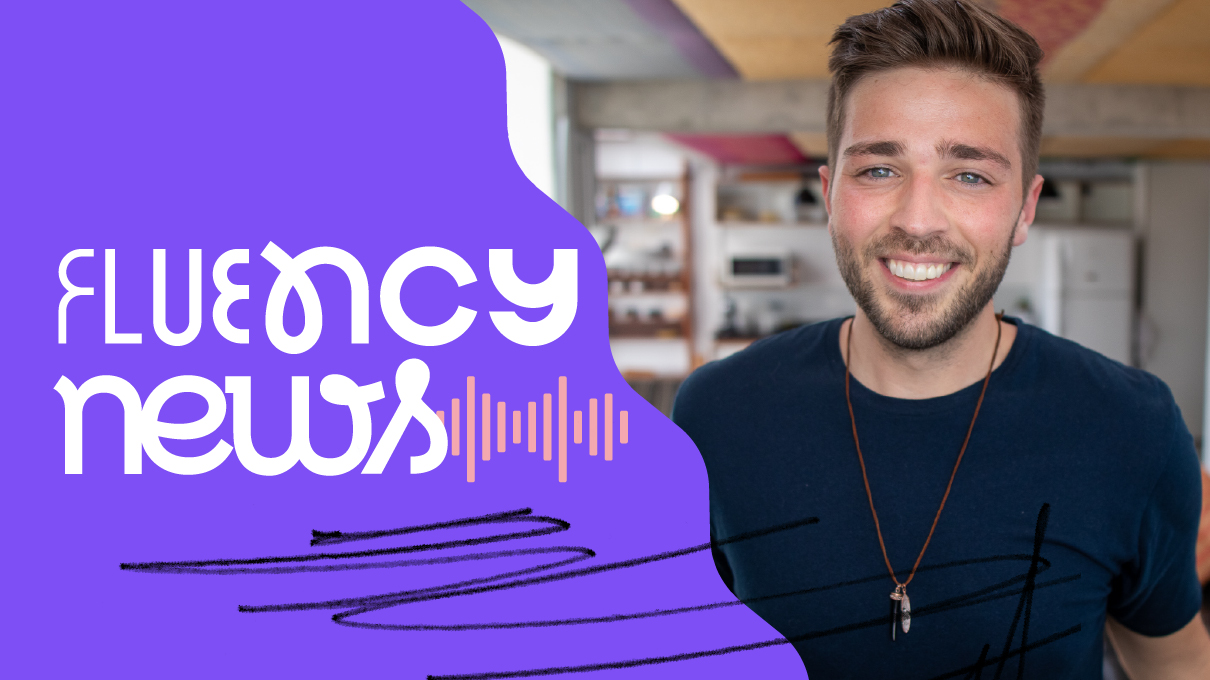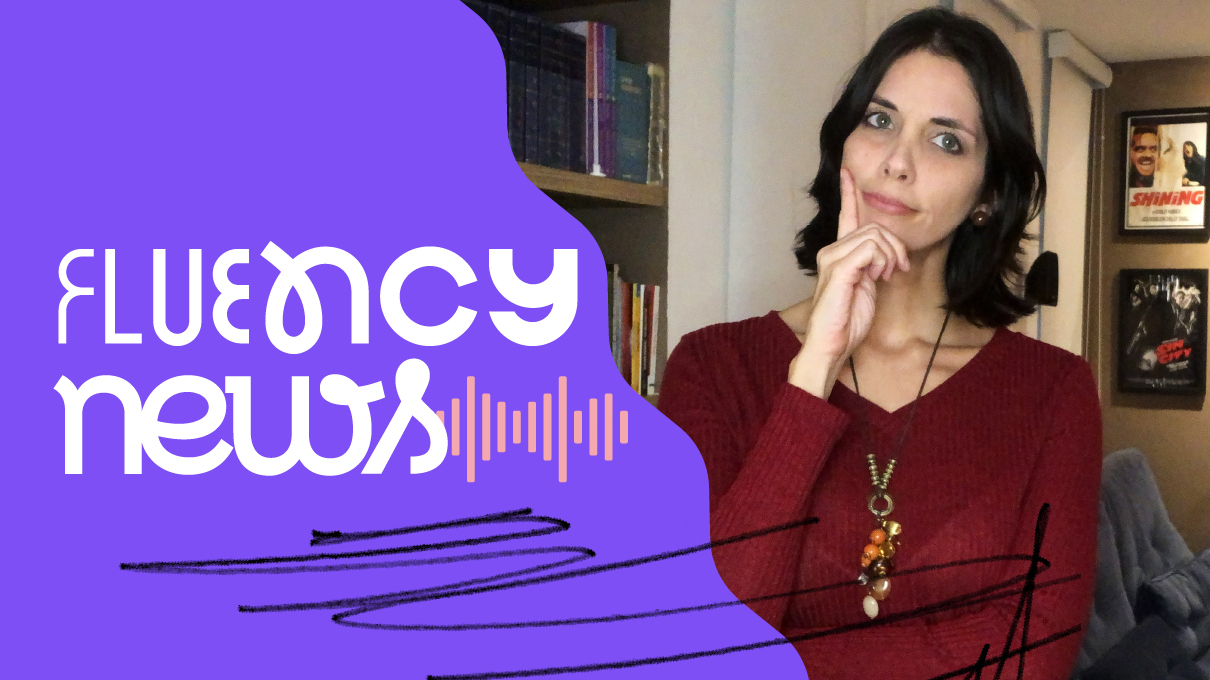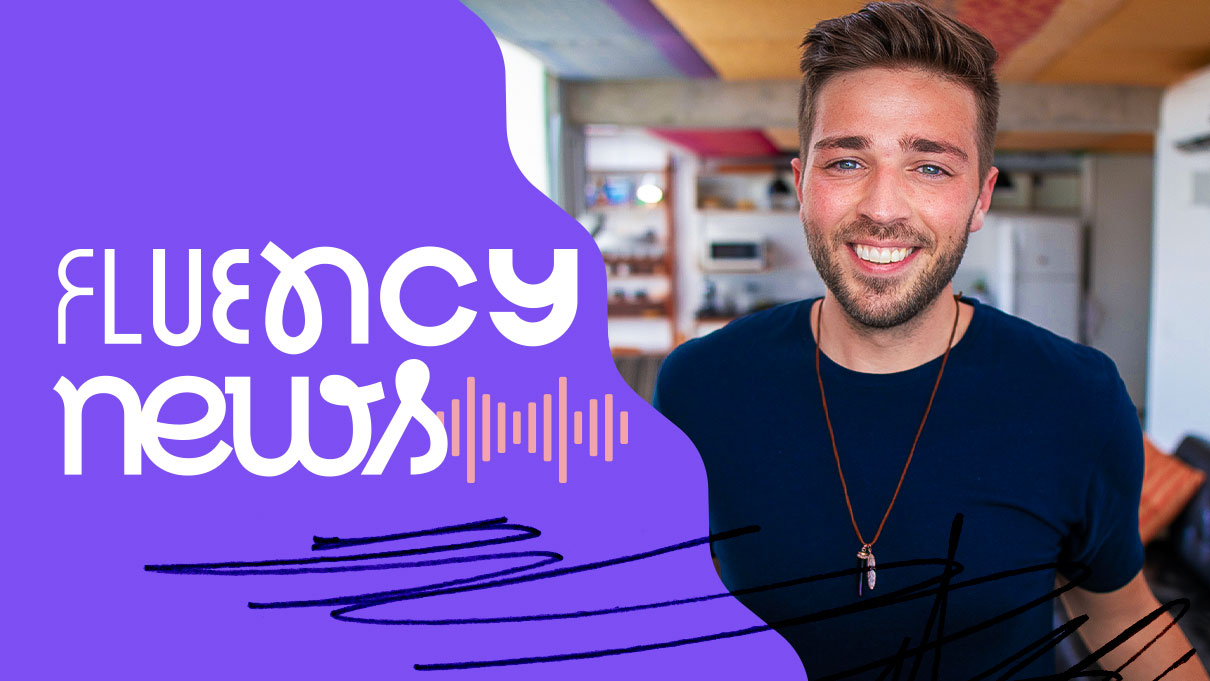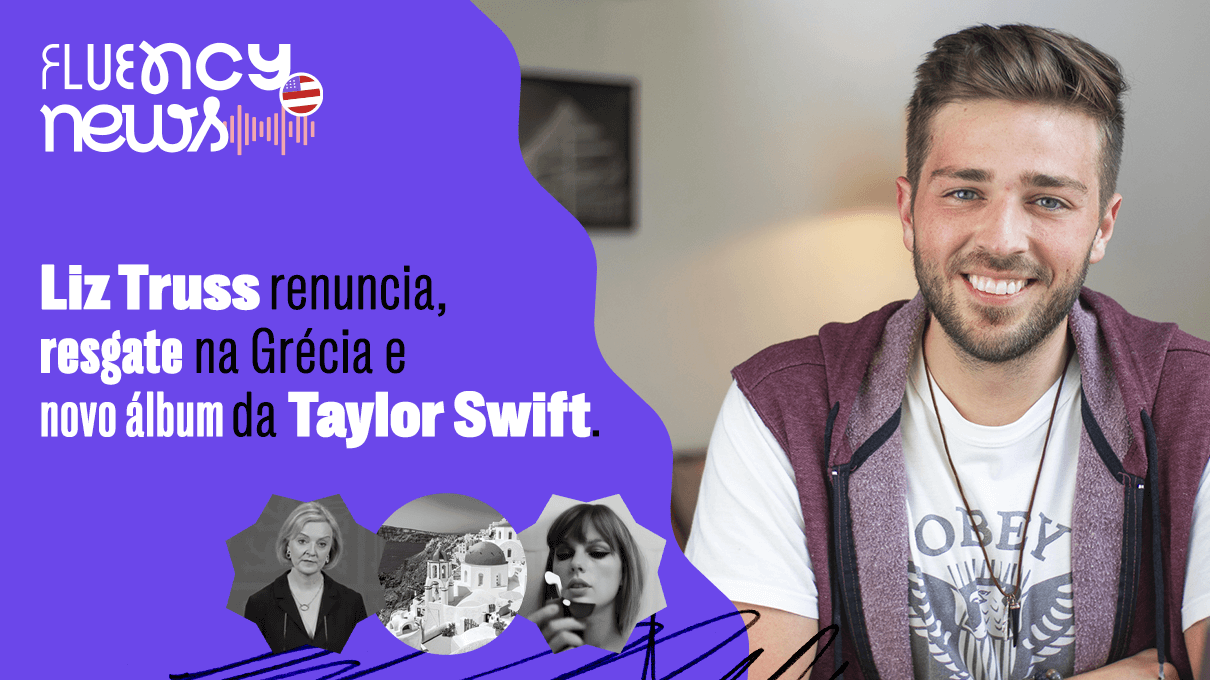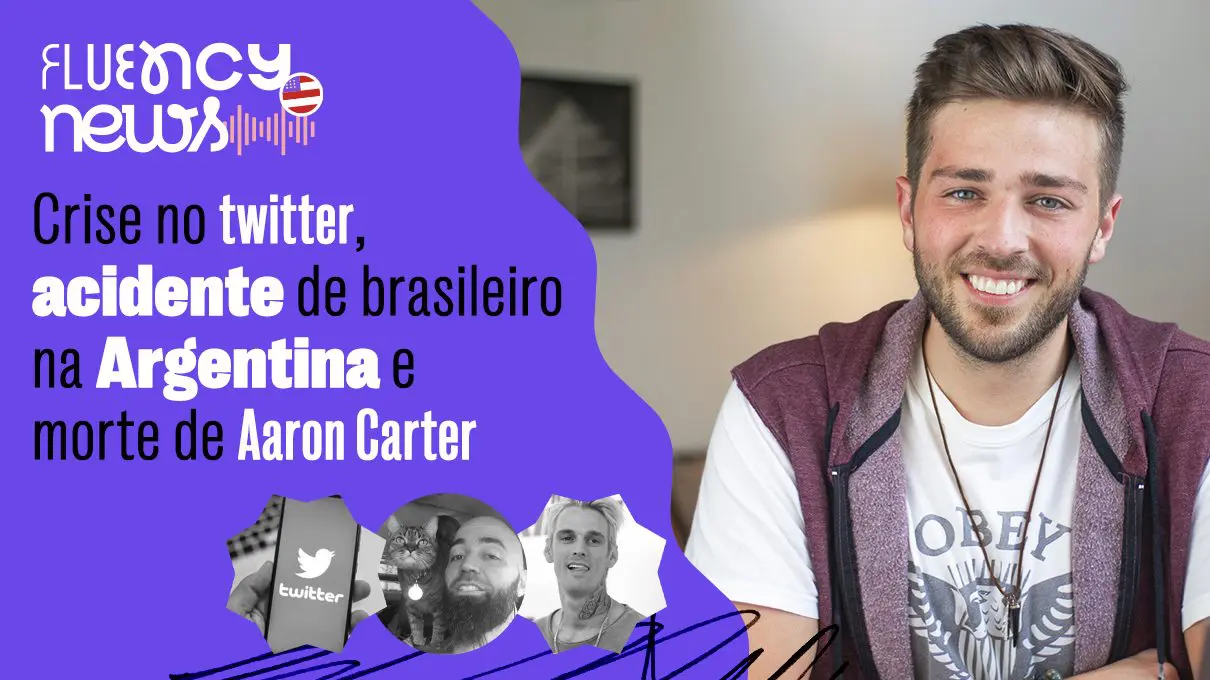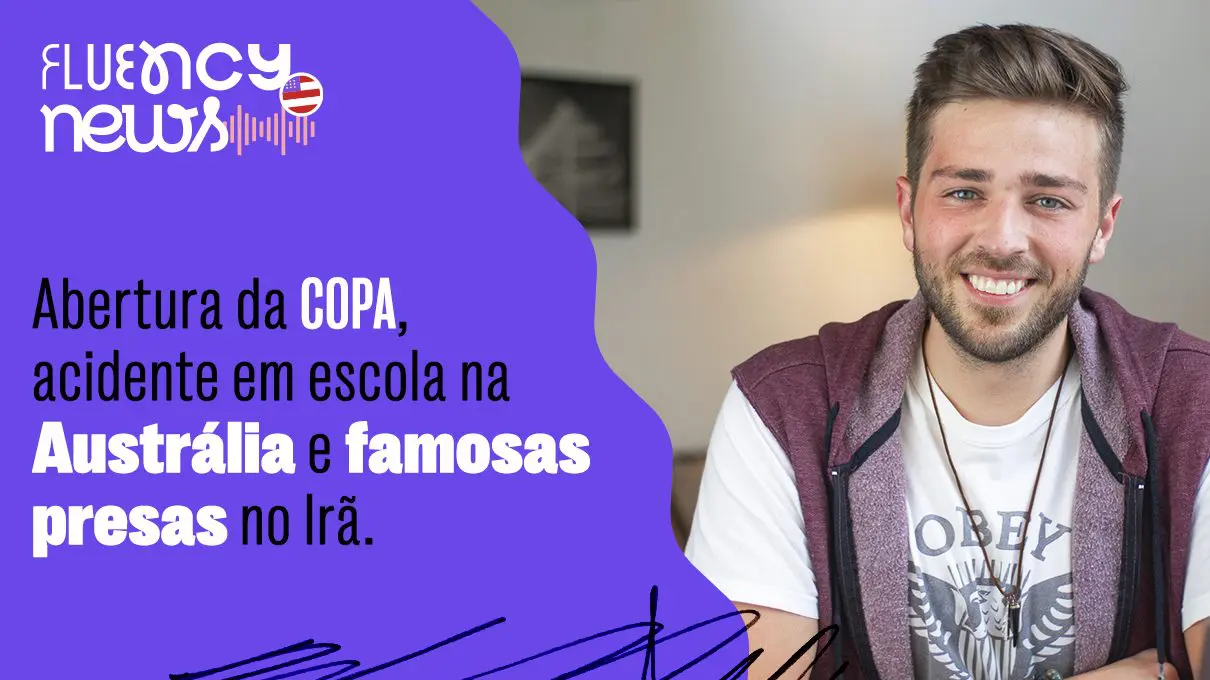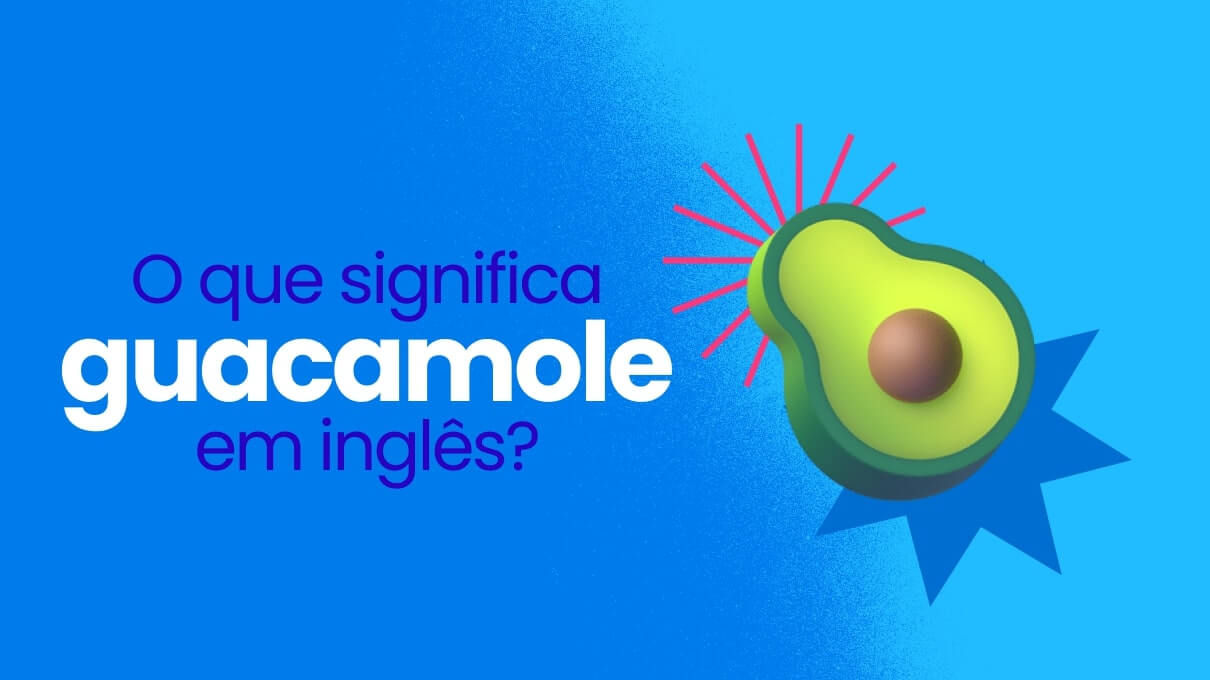Fluency News #16
Hello, everyone!
Sejam bem-vindos e bem-vindas a mais um episódio da nossa nova série de podcasts, o Fluency News! Aqui, você vai treinar a sua escuta e ficar por dentro do que está acontecendo no mundo, sempre com as três principais notícias da semana, tudo em inglês! Ao longo do episódio, nós também adicionamos explicações em português das coisas que achamos que precisam de mais atenção, assim você não perde nenhum detalhe!
No episódio desta semana, nós falamos sobre a descoberta de uma antiga “capela Sistina” na Amazônia, os protestos na França contra a violência policial, e a mulher que deu à luz um bebê com anticorpos para a COVID-19, após ter sido infectada durante a gravidez.
Nós temos uma nova página de dicas de inglês no Instagram, vá conferir! @fluencytvinglesToda semana temos um novo episódio do Fluency News, não deixe de escutar! See you!
Este episódio foi escrito por Lívia Pond.
TRANSCRIPT
What’s up, everyone? Welcome to Fluency News, Fluency Academy’s news podcast. I’m Scott Lowe, your host and teacher! This podcast series was thought of specially so you can train your listening and comprehension skills, while staying informed. That way, you’re adding English learning to your day to day, without interfering with your routine. Isn’t that awesome?
As always, we’re gonna see some of the biggest news stories of the week, and I’ll come in with explanations in Portuguese, of words, expressions or structures that we feel deserve a little more attention. Don’t forget to go to fluencytv.com to see the transcription of this episode and all our sources.
Alright, let’s get started! One of the world’s largest collections of prehistoric rock art has been discovered in the Amazonian rainforest.
Hailed as “the Sistine Chapel of the ancients”, archaeologists have found tens of thousands of paintings of animals and humans created up to 12,500 years ago across cliff faces that stretch across over twelve kilometers in Colombia. Their date is based partly on their depictions of now-extinct ice age animals, such as the mastodon, a prehistoric relative of the elephant that hasn’t roamed South America for at least 12,000 years. There are also images of giant sloths and ice age horses. These animals were all seen and painted by some of the very first humans ever to reach the Amazon. Their pictures give a glimpse into a lost, ancient civilisation. Such is the sheer scale of paintings that they will take generations to study.
The discovery was made last year by a British-Colombian team, funded by the European Research Council. It has been kept secret until now as it was filmed for a major Channel 4 series to be screened in December: Jungle Mystery: Lost Kingdoms of the Amazon. The site is in the Serranía de la Lindosa where, along with the Chiribiquete national park, other rock art had been found. The documentary’s presenter, Ella Al-Shamahi, an archaeologist and explorer, spoke of the excitement of seeing “breathtaking” images that were created thousands of years ago. The leader of the discovery team is José Iriarte, professor of archaeology at Exeter University and a leading expert on the Amazon and pre-Columbian history.
He said: “When you’re there, your emotions flow … We’re talking about several tens of thousands of paintings. It’s going to take generations to record them … Every turn you do, it’s a new wall of paintings. “We started seeing animals that are now extinct. The pictures are so natural and so well made that we have few doubts that you’re looking at a horse, for example. The ice-age horse had a wild, heavy face. It’s so detailed, we can even see the horse hair. It’s fascinating.”
The images include fish, turtles, lizards and birds, as well as people dancing and holding hands, among other scenes. The site is so remote that, after a two-hour drive from San José del Guaviare, a team of archaeologists and film-makers trekked on foot for around four hours. As the documentary notes, Colombia is a land torn apart after 50 years of civil war that raged between Farc guerrillas and the Colombian government, now with an uneasy truce in place. The territory where the paintings have been discovered was completely off limits until recently and still involves careful negotiation to enter safely.
Al-Shamahi said: “Exploration is not over. Scientific discovery is not over but the big discoveries now are going to be found in places that are disputed or hostile.” The paintings vary in size. There are numerous handprints and many of the images are on that scale, be they geometric shapes, animals or humans. Others are much larger. Some of the paintings are so high they can only be viewed with drones.
Iriarte believes that the answer lies in depictions of wooden towers among the paintings, including figures appearing to bungee jump from them. He added: “These paintings have a reddish terracotta colour. We also found pieces of ochre that they scraped to make them.” Al-Shamahi said: “One of the most fascinating things was seeing ice age megafauna because that’s a marker of time. I don’t think people realise that the Amazon has shifted in the way it looks. It hasn’t always been this rainforest. When you look at a horse or mastodon in these paintings, of course they weren’t going to live in a forest. They’re too big. Not only are they giving clues about when they were painted by some of the earliest people – that in itself is just mind-boggling – but they are also giving clues about what this very spot might have looked like: more savannah-like.”
Iriarte suspects that there are many more paintings to be found: “We’re just scratching the surface.” The team will be back as soon as Covid-19 allows.
Notícias que envolvem ciências de qualquer tipo normalmente têm alguns termos técnicos que podem ser difíceis de serem compreendidos. Além disso, em descobertas como essa, é comum que os cientistas usem adjetivos para explicar o que descobriram e como essas descobertas vão afetar o mundo. Vamos ver algumas dessas palavras. A palavra “rainforest”, por exemplo, traduzida literalmente, significa “floresta de chuva”, mas o significado real é “floresta tropical”. “Glimpse” significa “vislumbre”, “breathtaking” significa “empolgante”, ou mais literalmente, “de tirar o fôlego”. Uma expressão interessante é “mind-boggling”, que pode significar “incompreensível”, “supreendente”, “enorme”, “sensacional”.
In other news, tear gas and clashes happened at Paris protest against police violence. Thousands of critics of a proposed security law that would restrict sharing images of police officers in France gathered across the country in protest Saturday, with the country shaken by footage showing officers beating and racially abusing a Black man.
Some 133,000 people took to the streets across France, according to the government’s figures. Demonstrators in the French capital carried red union flags, the national tricolour flag and homemade signs denouncing police violence, demanding media freedom or calling for Interior Minister Gérald Darmanin’s resignation. Protests also took place in Bordeaux, Lille, Strasbourg, Montpellier, Nantes and other French cities.
Police fired tear gas in Paris after demonstrators launched fireworks at them, put up barricades and threw stones. “Thirty-seven police officers and gendarmes were injured during the demonstrations, according to provisional figures. I once again condemn the unacceptable violence against the security forces,” Darmanin wrote on Twitter. The crowd included journalists, journalism students, left-wing activists and citizens of varied political stripes expressing anger over what they perceive as hardening police tactics in recent years, especially since France’s Yellow Vest protests against economic hardship in 2018.
“There were all those protests in the summer against police violence, and this law shows the government didn’t hear us… It’s the impunity. That’s what makes us so angry,” protest participant Kenza Berkane, 26, told AP News.French President Emmanuel Macron on Friday said images of police beating a Black music producer in Paris put “shame” on the country, with top politicians and sportsmen expressing outrage over the incident. The case, coming on the heels of a violent evacuation of migrants in central Paris, has shocked the nation and galvanised opponents of the government’s controversial new security law.
One of the most disputed elements of the proposed law is Article 24, which would criminalise the publication of images of on-duty police officers with the intent of harming their “physical or psychological integrity”. It was passed by the National Assembly last week – although it is awaiting Senate approval – provoking protests and drawing condemnation from media organisations across France.
“The bill will not jeopardise in any way the rights of journalists or ordinary citizens to inform the public,” Alice Thourot, an MP for Macron’s La République En Marche (LREM) party and the co-author of the clause, told French daily Le Figaro last week. Article 24 would “outlaw any calls for violence or reprisals against police officers on social media – and that only”, Thourot said.
However, NGOs and journalists’ groups are calling for the article to be withdrawn, claiming that it contradicts “the fundamental public freedoms of our Republic”. “This bill aims to undermine the freedom of the press, the freedom to inform and be informed, the freedom of expression,” one of Saturday’s protest organisers said. In a sign that the government could be preparing to backtrack, Prime Minister Jean Castex announced Friday that he would appoint a commission to redraft Article 24.
Under the article, offenders could be sentenced to up to a year in jail, and fined 45,000 euros (over R$ 280,000) for sharing images of police officers. Media unions say it could give police a green light to prevent journalists – and social media users – from documenting abuses.
As palavras “would” e “could” são o que chamamos de verbos modais. Esses modais são modificadores. Eles alteram o significado de palavras e das frases em que são inseridos. “Would” não tem uma tradução específica, mas equivale ao “RIA” que nós adicionamos quando falamos de condicionais. Então quando eu digo que a proposta de lei WOULD RESTRICT, estou dizendo que ela restringiRIA. “Could” tem alguns usos diferentes, mas basicamente pode ser usado de três formas. Para falar de habilidades passadas, para fazer pedidos educados, e como vemos nessa notícia, para falar de possibilidades futuras. Quando usado nesse último caso, ele pode ser traduzido para “poderia”.
And finally, in this episode, let’s talk about the pregnant Singapore woman that gave birth to a baby with COVID-19 antibodies. A “dramatic” pregnancy brought on by getting Covid-19 when she was pregnant ended in tears of joy when Mrs Celine Ng-Chan, 31, gave birth to her second child earlier this month. To the private tutor’s relief, her son, Aldrin, was not only born free of Covid-19, he even has antibodies against the virus, according to his paediatrician. Mrs Ng-Chan is one of a few women in Singapore who were infected with the coronavirus during their pregnancies to have given birth so far.
She said: “It’s very interesting. His paediatrician said my Covid-19 antibodies are gone but Aldrin has Covid-19 antibodies. “My doctor suspects I have transferred my Covid-19 antibodies to him during my pregnancy.” The Sunday Times understands Aldrin’s antibodies suggest that he has immunity to the virus. Weighing 3.5 kg at birth, he was born on Nov 7 at the National University Hospital (NUH), and looked exactly like his elder sister, Aldrina, 2, at her birth, Mrs Ng-Chan added.
Mrs Ng-Chan said her pregnancy was a dramatic one, as she, her mother and her daughter all contracted Covid-19 after returning from a family holiday to Europe in March. Her husband and father, who were on the trip as well, escaped infection. Mrs Ng-Chan’s mother, Madam Choy Wai Chee, 58, came close to death. Mrs Ng-Chan and Aldrina were only mildly ill and were discharged from hospital after 2.5 weeks. When she was diagnosed with Covid-19, Mrs Ng-Chan was 10 weeks pregnant. She said: “I wasn’t worried that Aldrin would get Covid-19 as I read that the transmission risk (from mother to the fetus) is very low.”
She was also aware of another couple, Natasha and Pele Ling, who were expecting their first child when they both fell ill with Covid-19 in March.Mrs Ling, a 29-year-old speech and language therapist, tested positive for the coronavirus in her 36th week of pregnancy in March. She gave birth to Boaz on April 26 at the NUH. Baby Boaz was possibly the first baby born in Singapore with Covid-19 antibodies. It is not known how many babies in Singapore have been born to women who had Covid-19 while they were pregnant. Chairman of the obstetrics and gynaecology division at KK Women’s and Children’s Hospital (KKH), Associate Professor Tan Hak Koon, told The Straits Times that the number of pregnant women infected with Covid-19 under the hospital’s care is “very low”, and none has as yet given birth.
Prof Tan said guidelines published by the Royal College of Obstetricians and Gynaecologists in the United Kingdom in October said current evidence suggests that transmission of Covid-19 from a pregnant woman to her baby during pregnancy or birth is uncommon.Current evidence also shows that whether the newborn infant catches Covid-19 from his mother is not affected by the mode of delivery, feeding choice such as breast or bottle feeding, or if the mother and baby stayed in the same room after delivery. At NUH, a spokesman said that babies born to women who have recovered from Covid-19 are assessed comprehensively by a team of doctors. Mrs Ng-Chan said she was filled with joy and gratitude over the new addition to her family.
“My pregnancy and birth was smooth sailing despite being diagnosed with Covid-19 in my first trimester, which is the most unstable stage of the pregnancy. I’m very blessed to have Aldrin and he came out very healthy,” she said. “I feel relieved my Covid-19 journey is finally over now.”
Algumas palavras nessa notícia terminam em “LY”, você reparou? Como mildly, comprehensively e possibly. Esse LY no fim, é um sufixo, adicionado para transformar palavras em advérbios. Ele equivale ao nosso MENTE. Essas palavras então ficam “suavemente”, “compreensivamente” e “possivelmente”.
And that is it for this week’s episode, guys! We hope you enjoyed this time here with us, and we’re glad to have you with us episode after episode. Fluency News comes to you every week, and I’ll be here, waiting for you. Remember to check out fluencytv.com for more free content in five different languages, the transcript of this episode and all our sources. I’ll see you next time. Peace out.
SOURCES
‘Sistine Chapel of the ancients’ rock art discovered in remote Amazon forest https://www.theguardian.com/science/2020/nov/29/sistine-chapel-of-the-ancients-rock-art-discovered-in-remote-amazon-forest?CMP=Share_AndroidApp_Other
Tear gas and clashes at Paris protest against police violence https://www.france24.com/en/france/20201128-anger-at-police-beating-galvanises-french-protests-against-security-bill
Infected after holiday to Europe, pregnant Singapore mum gives birth to baby with Covid-19 antibodies https://www.straitstimes.com/singapore/infected-after-holiday-to-europe-pregnant-mum-gives-birth-to-baby-with-covid-19-antibodies
Playlist



































































